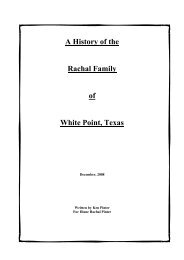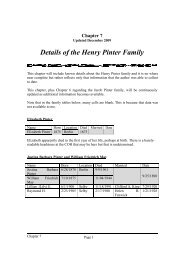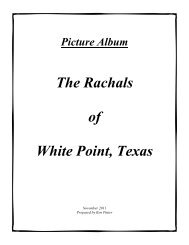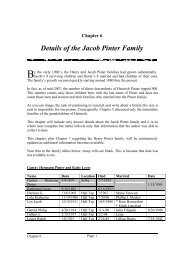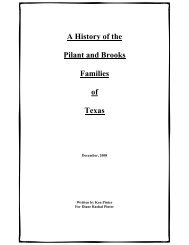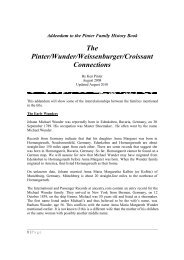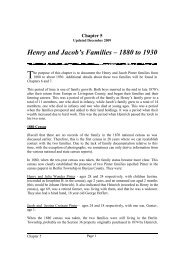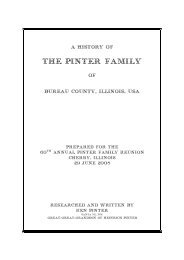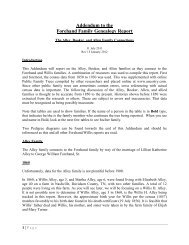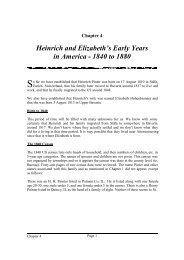Early Farm Life in Bureau County, Illinois, and ... - New Page 1
Early Farm Life in Bureau County, Illinois, and ... - New Page 1
Early Farm Life in Bureau County, Illinois, and ... - New Page 1
Create successful ePaper yourself
Turn your PDF publications into a flip-book with our unique Google optimized e-Paper software.
Passage to <strong>Bureau</strong> <strong>County</strong> <strong>and</strong> the early years of He<strong>in</strong>rich <strong>and</strong> Family<br />
We will probably never know the exact circumstances surround<strong>in</strong>g He<strong>in</strong>rich <strong>and</strong> Elizabeth’s<br />
arrival <strong>in</strong> the US. We might never know why they left Germany except to say that there was a<br />
migration to the US from Germany <strong>and</strong> other European countries prompted by poverty,<br />
religious convictions, <strong>and</strong> the urge to go west to the US.<br />
1820-1871 - Economic hardships, <strong>in</strong>clud<strong>in</strong>g those<br />
caused by unemployment, crop failure <strong>and</strong> starvation,<br />
was the primary cause of emigration dur<strong>in</strong>g this period,<br />
<strong>in</strong> comb<strong>in</strong>ation with wars <strong>and</strong> military service. Most of<br />
the emigrants came from Alsace-Lorra<strong>in</strong>e, Baden,<br />
Hessen, Rhe<strong>in</strong>l<strong>and</strong>, <strong>and</strong> Württemberg.<br />
Source: http://www.roll<strong>in</strong>tl.com/roll/gr1900us.htm<br />
The follow<strong>in</strong>g article was taken from an article titled Ill<strong>in</strong>ois, the Prairie State, by the Lee<br />
<strong>County</strong> Historical Society, which was found on the Web site<br />
http://www.leecountyhistory.com/articles/931118.htm.<br />
Lee <strong>County</strong> shares a border with <strong>Bureau</strong> <strong>County</strong>.<br />
Together, the railroad, the new plow <strong>and</strong> the reaper made it<br />
possible to settle <strong>and</strong> farm the Midwest. Now the people<br />
came to the prairies, not by wagon tra<strong>in</strong> or oxcart, but by<br />
barge, steamboat <strong>and</strong> tra<strong>in</strong>. They came not by the hundreds<br />
but by the thous<strong>and</strong>s. In the half century between 1840 <strong>and</strong><br />
1890 the population of Ill<strong>in</strong>ois went from 476,000 to nearly<br />
4 million. And it was the great European migrations of the<br />
n<strong>in</strong>eteenth century that so <strong>in</strong>creased the population so<br />
rapidly. On the heels of the English <strong>and</strong> Scots came the<br />
Irish. Then followed by Norwegians, Germans, Poles,<br />
Czechs, Russians, Italians, French, Dutch, <strong>and</strong> Belgians.<br />
To many the state offered liv<strong>in</strong>g space for homes, farms<br />
<strong>and</strong> crops such as they had never dreamed of. These<br />
immigrants came first as homesteaders or as they came to<br />
be called, "sodbusters." And it was their thought to make<br />
Ill<strong>in</strong>ois prairies one of the most productive farm<strong>in</strong>g regions<br />
<strong>in</strong> the country. As Chicago grew <strong>in</strong>to a city, its labor force<br />
grew <strong>in</strong> its stockyards, railroad yards, mills <strong>and</strong> factories.<br />
Great numbers were migrat<strong>in</strong>g from the south <strong>in</strong>to the state.<br />
In the 1850's Chicago <strong>and</strong> Ill<strong>in</strong>ois became the heart of a<br />
giant new <strong>in</strong>dustry. Iron ore was shipped down from the<br />
Great Lakes from northern M<strong>in</strong>nesota, while up from<br />
southern Ill<strong>in</strong>ois, which had been found to have the richest<br />
bitum<strong>in</strong>ous coal deposits <strong>in</strong> the nation, soon came mile long<br />
Chapter 8 <strong>Page</strong> 2



